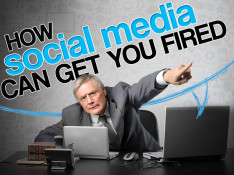How social media can get you fired
It’s a publishing tool,  a source of news and information but also a dangerous place for the overzealous. In a piece which first ran in Encore, Matt Smith looks at how social media can sound the death knell on your career.
a source of news and information but also a dangerous place for the overzealous. In a piece which first ran in Encore, Matt Smith looks at how social media can sound the death knell on your career.
In less than 140 characters controversial comedian Catherine Deveny made a joke that would cost her her job. It was 2010 and while she wasn’t the only one providing couch commentary for the Logies on Twitter that night, few experienced a similar backlash. The next day Deveny, then a columnist for Melbourne’s The Age newspaper, was sacked. She had held the position since 2001.
While Deveny did not respond to Encore’s request for an interview, she has defended her actions on numerous occasions. The day following her sacking, she was a guest on the 774 ABC Radio show Mornings with John Faine. After Faine explained the situation and read out the offending tweets, Deveny responded.


Interesting article.
In Summary:
1. Understand the difference between public and private.
2. Don’t tweet under the influence
3. Don’t be a potty mouth
4. Remember your actions reflect on your employer/sponsors.
Doesn’t sound to complicated to follow does it? Yet still plenty of people get it wrong and I think the reason is the attempt to be interesting. Much like face to face conversation there is a remarkably fine line to walk if you want to come across as both charismatic and not a buffoon.
On the one side you can come across as reasonable, thoughtful, polite, intelligent – and in these days of pandering to the lowest common denominator – far too “boring” to follow. On the other you hand you can come across as sick, immature, stupid, insensitive – desperate for attention.
To come across as interesting and not scum is a hard job and I suspect – frankly not worth it unless your targeting a small and specific demographic. If you’ve got a huge twitter following – it’s a pretty good sign you are embarrassing yourself.
Hugo, how can you be so right, yet….. So right. Not sure you would garner many retweets, but.